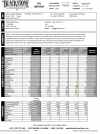Hey guys,
I’m in the market for a used WK2 Grand Cherokee. I’m coming from a Range Rover Supercharged, so I’m exclusively looking at the Overland models. I checked out three already. One was a 2012 with a Hemi, 80k miles, but the rear subframe was a flaky, rusty mess. Someone was often at the boat ramp with it. I didn’t even test drive it. Next was a 2014 Overland 3.6 with 85k miles, but it was beat on. No go.
Yesterday I looked at a 1-owner 2014 ED Grand Cherokee Overland with 92k miles, loaded up with radar cruise. Excellent condition visually but will be going back Monday as the dealer (DCJR dealer) was closing for the day.
It has had R69, V08 recalls completed. It has not had VA7 or W41 performed. There’s also W79 and Z86 outstanding. Parts are not available for Z86 according to Mopar’s site.
Its a new arrival at a local Jeep dealer, the original owner purchased it there. They seem very cagey on their site about mentioning it’s a diesel (maybe because fuel prices, maybe because of the reliability?) If I do end up looking at it, I'm going to play dumb and pull the “Oh jeez, it’s a diesel?… I dunno, I was expecting it to be a 3.6…” line to try and bargain a bit or at least try to work on a better warranty.
From what I've read, GDE tunes (now compliant) are pretty much universally accepted in the community. They reduce soot formation in the intake and oil, limit driving regen cycles which in turn reduces excessive fuel injection during the exhaust stroke which can dilute the oil. EGR control (no longer deleted) is better than stock which helps reduce carbon being reintroduced into the engine and wearing down the crosshatching on the cylinder walls. EGR coolers can crack and allow coolant to mix with engine oil, which can also mean the end to crank bearings. Am I correct in saying the press-fit timing sprocket issue seems blown way out of proportion from my reading? Does all this sound about right?
I tow a modest 3500 pound pop up camper regularly throughout the summer months, and I will be switching jobs to a 90 mile RT commute, all highway. I am always up on my maintenance, try to do my research and already have the WK2 service manuals. I do my oil changes at 5k miles religiously, no exception (Range Rover is 15k interval, no dipstick, yeah right!) and do most repairs myself. Would an ED be a good fit? Should I take the chance and go for it? Should I only jump in with a substantial warranty? Should I walk away and look for a gas JGC? It worries me that it's a first year ED. Are these Dealer Queens? I've heard of 1-3 month waits for parts and repairs.
I'm curious what you guys think.
Nick
I’m in the market for a used WK2 Grand Cherokee. I’m coming from a Range Rover Supercharged, so I’m exclusively looking at the Overland models. I checked out three already. One was a 2012 with a Hemi, 80k miles, but the rear subframe was a flaky, rusty mess. Someone was often at the boat ramp with it. I didn’t even test drive it. Next was a 2014 Overland 3.6 with 85k miles, but it was beat on. No go.
Yesterday I looked at a 1-owner 2014 ED Grand Cherokee Overland with 92k miles, loaded up with radar cruise. Excellent condition visually but will be going back Monday as the dealer (DCJR dealer) was closing for the day.
It has had R69, V08 recalls completed. It has not had VA7 or W41 performed. There’s also W79 and Z86 outstanding. Parts are not available for Z86 according to Mopar’s site.
Its a new arrival at a local Jeep dealer, the original owner purchased it there. They seem very cagey on their site about mentioning it’s a diesel (maybe because fuel prices, maybe because of the reliability?) If I do end up looking at it, I'm going to play dumb and pull the “Oh jeez, it’s a diesel?… I dunno, I was expecting it to be a 3.6…” line to try and bargain a bit or at least try to work on a better warranty.
From what I've read, GDE tunes (now compliant) are pretty much universally accepted in the community. They reduce soot formation in the intake and oil, limit driving regen cycles which in turn reduces excessive fuel injection during the exhaust stroke which can dilute the oil. EGR control (no longer deleted) is better than stock which helps reduce carbon being reintroduced into the engine and wearing down the crosshatching on the cylinder walls. EGR coolers can crack and allow coolant to mix with engine oil, which can also mean the end to crank bearings. Am I correct in saying the press-fit timing sprocket issue seems blown way out of proportion from my reading? Does all this sound about right?
I tow a modest 3500 pound pop up camper regularly throughout the summer months, and I will be switching jobs to a 90 mile RT commute, all highway. I am always up on my maintenance, try to do my research and already have the WK2 service manuals. I do my oil changes at 5k miles religiously, no exception (Range Rover is 15k interval, no dipstick, yeah right!) and do most repairs myself. Would an ED be a good fit? Should I take the chance and go for it? Should I only jump in with a substantial warranty? Should I walk away and look for a gas JGC? It worries me that it's a first year ED. Are these Dealer Queens? I've heard of 1-3 month waits for parts and repairs.
I'm curious what you guys think.
Nick
